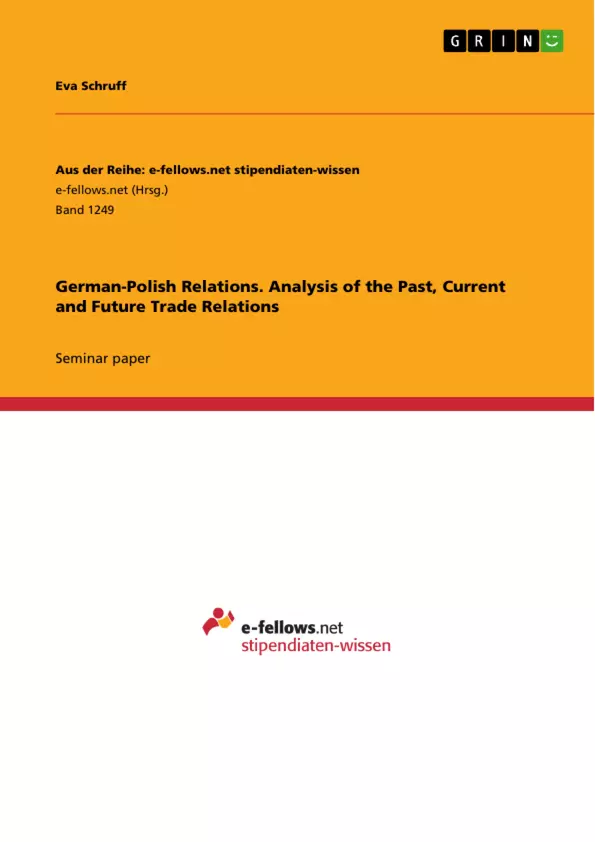This term paper explores the effect of culture on international business. In order to do so, it first evaluates the influence of national culture and then the influence of corporate culture on international management. In the end it presents and analyzes a new framework which argues that these two types of culture interrelate and that both shape international management practices.
In 2010 Wal-Mart Inc. has been the world’s top retailer with revenues of US$ mil 405,046. However, they have never managed to establish Wal-Mart Germany since they have entered the market in late 1997. They left the market with huge losses in 2006.
“In Germany, analysts say, Wal-Mart never got traction in a market characterized by unrelenting price competition, well-established discounters and the cultural resistance of German shoppers to hypermarkets, which sell fresh vegetables a few aisles away from lawn mowers.”
Inhaltsverzeichnis (Table of Contents)
- Poland - a brief insight
- Review of bilateral relations
- Historical relations
- Political relations
- Economical relations
- Cultural and educational relations
- Analysis of the current situation
- Poland's economy
- Bilateral trade
- Trade Agreements and Organizations
- Outlook
- Strengths
- Weaknesses
- Opportunities
- Threats
Zielsetzung und Themenschwerpunkte (Objectives and Key Themes)
This document aims to provide a comprehensive analysis of the past, present, and future of German-Polish relations, focusing particularly on trade aspects.
- Historical relations between Germany and Poland
- Current political and economic relations
- Trade agreements and organizations
- Future prospects of German-Polish relations
- The role of trade in shaping the relationship
Zusammenfassung der Kapitel (Chapter Summaries)
- Poland - a brief insight: This section provides a concise overview of Poland's geographical location, population, economy, and political system, offering a basic understanding of the country's context.
- Review of bilateral relations: This section delves into the history of German-Polish relations, highlighting key events, conflicts, and periods of cooperation. It examines the evolution of the relationship from the early 20th century to the present day, emphasizing the impact of historical factors.
- Analysis of the current situation: This section analyzes the current state of German-Polish relations, focusing on political, economic, and cultural aspects. It examines the role of the European Union and the impact of recent events on bilateral cooperation.
- Poland's economy: This section provides an overview of Poland's economic performance, including GDP growth, trade patterns, and key sectors. It explores the challenges and opportunities facing the Polish economy in the context of global economic trends.
- Bilateral trade: This section examines the dynamics of trade between Germany and Poland, highlighting key trends, trade agreements, and the role of major economic sectors.
- Trade Agreements and Organizations: This section explores the framework of trade agreements and international organizations that shape German-Polish trade relations. It analyzes the impact of these agreements on the bilateral economic relationship.
- Outlook: This section examines the future prospects of German-Polish relations, focusing on potential opportunities and challenges. It includes a SWOT analysis to identify the strengths, weaknesses, opportunities, and threats facing the bilateral relationship.
Schlüsselwörter (Keywords)
Key terms and concepts covered in this analysis include German-Polish relations, bilateral trade, historical relations, political relations, economic relations, European Union, trade agreements, economic performance, SWOT analysis, and trade organizations.
Frequently Asked Questions
What is the history of German-Polish trade relations?
The relations have evolved from historical conflicts to deep economic cooperation, especially since Poland joined the European Union, making Germany its most important trading partner.
How does culture affect international business between Germany and Poland?
National and corporate cultures interrelate, shaping management practices. Cultural resistance or differences in consumer behavior (as seen in Wal-Mart's failure in Germany) are key factors.
What are the current economic strengths of Poland?
Poland's strengths include robust GDP growth, a strategic geographic location, and strong trade patterns within the EU framework.
What are the future prospects for bilateral trade?
A SWOT analysis identifies opportunities in further integration and threats like global economic shifts, while highlighting the potential for continued growth in bilateral trade agreements.
What role does the European Union play in German-Polish relations?
The EU provides the framework for trade agreements, organizational standards, and political stability that facilitate bilateral economic exchange.
- Quote paper
- Eva Schruff (Author), 2013, German-Polish Relations. Analysis of the Past, Current and Future Trade Relations, Munich, GRIN Verlag, https://www.grin.com/document/300255



